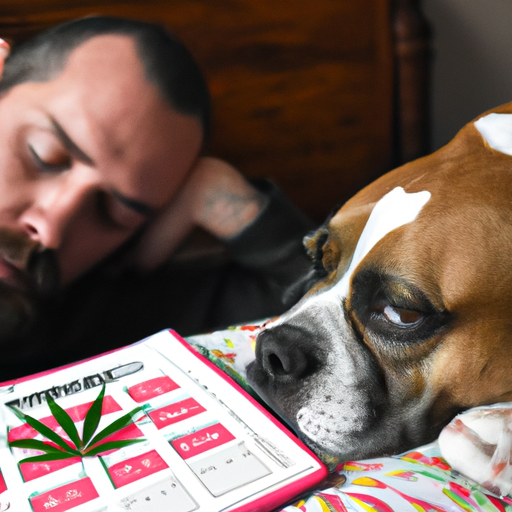As a caregiver, your pet’s health is undoubtedly your top priority. You might have heard about the potential dangers of THC toxicity in dogs, leading you to question, “How long does THC toxicity last in dogs?” This article aims to provide you with a comprehensive understanding of THC toxicity in dogs, its symptoms, effects, treatment, and prevention.
Understanding THC Toxicity in Dogs
THC, or tetrahydrocannabinol, is the primary psychoactive component in marijuana. While it can provide a euphoric effect for humans, it is toxic for dogs, leading to a condition known as THC toxicity or marijuana poisoning. Even the smallest ingestion of THC can cause adverse reactions in your dog.
Symptoms of THC Toxicity
Before diving into the duration of THC toxicity, let’s understand the symptoms that can indicate your dog has ingested THC:
- Altered behaviour: Your dog may show signs of anxiety, disorientation, or lethargy.
- Physical symptoms: These can include dilated pupils, drooling, tremors, vomiting, and in severe cases, seizures.
- Changes in heart rate: THC can either slow down or speed up your dog’s heart rate.
- Urinary incontinence: Your dog may have difficulty controlling their bladder.
If your dog exhibits any of these symptoms and you suspect THC ingestion, seek veterinary attention immediately.
Duration of THC Toxicity in Dogs
THC toxicity’s duration can vary based on a few factors:
- Amount consumed: Larger amounts of THC can lead to longer durations of toxicity.
- Size of the dog: Smaller dogs may experience longer durations of toxicity.
- Individual metabolism: Just like humans, dogs have individual metabolic rates that can affect how long THC stays in their system.
On average, symptoms of THC toxicity can last between 30 minutes to several days. However, THC can remain detectable in a dog’s system for much longer, up to several weeks.
Treatment and Recovery from THC Toxicity
When it comes to treating THC toxicity, there’s no specific antidote. Instead, treatment focuses on supportive care and managing symptoms. This can include:
- Inducing vomiting: If the ingestion of THC was recent, your vet might induce vomiting to remove any remaining substance from the stomach.
- Activated charcoal: This can be used to prevent further absorption of THC into the dog’s system.
- Intravenous fluids: These can help flush out the THC from your dog’s system faster.
- Medication: In cases of severe symptoms like seizures, medication might be required.
Recovery time can range from a few hours to a few days, depending on the factors mentioned earlier.
Preventing THC Toxicity in Dogs
Prevention is always better than cure. Here are some steps you can take to prevent THC toxicity in your dog:
- Store all marijuana products securely and out of your dog’s reach.
- If you’re using marijuana, ensure your dog is in a separate, well-ventilated area.
- Educate yourself and others in your household about the dangers of THC toxicity in dogs.
| Prevention Steps | Description |
|---|---|
| Secure storage | Keep all marijuana products out of reach |
| Ventilation | Ensure your dog is not exposed to marijuana smoke |
| Education | Understand the risks and inform others |
Frequently Asked Questions (FAQ)
Q: Can dogs die from THC toxicity?
A: While rare, severe cases of THC toxicity can be life-threatening. It’s crucial to seek immediate veterinary care if you suspect your dog has ingested THC.
Q: Can my dog get THC toxicity from secondhand smoke?
A: Yes, dogs can get THC toxicity from secondhand smoke, although it’s less common than ingestion. Always ensure your dog is in a well-ventilated area if you’re using marijuana.
Q: Are some dogs more susceptible to THC toxicity than others?
A: Yes, smaller dogs or those with a slower metabolism may be more susceptible to THC toxicity.
Q: What should I do if my dog ingests THC?
A: If your dog ingests THC, seek immediate veterinary care. Do not attempt to treat the condition at home.
Q: Can vets test for THC toxicity?
A: Yes, vets can perform a urine test to check for the presence of THC in your dog’s system.
Remember, as a caregiver, your dog’s health and well-being are in your hands. Stay informed, stay vigilant, and always keep your pet’s environment safe and secure from potential hazards like THC.



